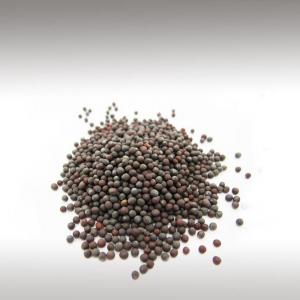
BLACK MUSTARD OIL (BRASSICA NIGRA) - BASE OILS

BASE / GENERAL DATA
Information submited: June 19, 2014 Modified: April 3, 2018 By: OperaDreamhouse
It is an annual plant with a much-branched stem, and lobed, roughly
lyre-shaped leaves, 16cm long. Bright yellow flowers are produced all
summer, followed by small, erect, 4-angled pods with dark brown seeds.
The term Mustard oil is used for two different oils that are made from Mustard seeds:
A fatty vegetable oil resulting from pressing the seeds.
An essential oil resulting from grinding the seeds, mixing them with water, and extracting the resulting volatile oil by distillation.
It is often used for cooking in North India, Eastern India, Nepal, Bangladesh and Pakistan. In Bengal, Orissa, Assam and Nepal, it is the traditionally preferred oil for cooking. The oil makes up about 30% of the Mustard Seeds.
Mustard oil has about 60% monounsaturated fatty acids (42% erucic acid and 12%oleic acid). It has about 21% polyunsaturated fats (6% the omega-3alpha-linolenicacid and 15% the omega-6 linoleicacid), and it has about 12% saturated fats.
The Mustards, Black and White, are both wild herbs growing in waste places in this country, but are cultivated for their seeds, which are valuable medicinally and commercially. They were originally treated as members of a small genus of frequently cultivated European and Asiatic herbs named Sinapis, from the Greek "Sinapi" (Mustard), a name used by Theophrastus, but they are now generally included in the Cabbage genus, Brassica.
The oil makes up about 30% of the Mustard Seeds. It can be produced from Black Mustard (Brassica nigra), brown Indian Mustard (Brassica Juncea), and White Mustard (Brassica Hirta).
Now we talk about Black Mustard oil (Brassica Nigra):
The plant is believed to be native to the southern Mediterranean region of Europe and possibly South Asia where it has been cultivated for thousands of years. The spice is generally made from ground seeds of the plant, with the seed coats removed. The small (1 mm) seeds are hard and vary in color from dark brown to black. They are flavorful, although they have almost no aroma.
Mustard oil has about 60% monounsaturated fatty acids (42% erucic acid and 12% oleic acid) it has about 21% polyunsaturated fats (6% the omega-3 alpha-linolenic acid and 15% the omega-6 linoleic acid), and it has about 12% saturated fats. Mustard oil has high levels of both alpha-Linolenic acid and erucic acid.
It is dark yellow in color and slightly pungent. Black Mustard (Brassica Nigra) fell out of use in commercial Mustard products in the 1950s.
The term Mustard oil is used for two different oils that are made from Mustard seeds:
A fatty vegetable oil resulting from pressing the seeds.
An essential oil resulting from grinding the seeds, mixing them with water, and extracting the resulting volatile oil by distillation.
It is often used for cooking in North India, Eastern India, Nepal, Bangladesh and Pakistan. In Bengal, Orissa, Assam and Nepal, it is the traditionally preferred oil for cooking. The oil makes up about 30% of the Mustard Seeds.
Mustard oil has about 60% monounsaturated fatty acids (42% erucic acid and 12%oleic acid). It has about 21% polyunsaturated fats (6% the omega-3alpha-linolenicacid and 15% the omega-6 linoleicacid), and it has about 12% saturated fats.
The Mustards, Black and White, are both wild herbs growing in waste places in this country, but are cultivated for their seeds, which are valuable medicinally and commercially. They were originally treated as members of a small genus of frequently cultivated European and Asiatic herbs named Sinapis, from the Greek "Sinapi" (Mustard), a name used by Theophrastus, but they are now generally included in the Cabbage genus, Brassica.
The oil makes up about 30% of the Mustard Seeds. It can be produced from Black Mustard (Brassica nigra), brown Indian Mustard (Brassica Juncea), and White Mustard (Brassica Hirta).
Now we talk about Black Mustard oil (Brassica Nigra):
The plant is believed to be native to the southern Mediterranean region of Europe and possibly South Asia where it has been cultivated for thousands of years. The spice is generally made from ground seeds of the plant, with the seed coats removed. The small (1 mm) seeds are hard and vary in color from dark brown to black. They are flavorful, although they have almost no aroma.
Mustard oil has about 60% monounsaturated fatty acids (42% erucic acid and 12% oleic acid) it has about 21% polyunsaturated fats (6% the omega-3 alpha-linolenic acid and 15% the omega-6 linoleic acid), and it has about 12% saturated fats. Mustard oil has high levels of both alpha-Linolenic acid and erucic acid.
It is dark yellow in color and slightly pungent. Black Mustard (Brassica Nigra) fell out of use in commercial Mustard products in the 1950s.

SPIRITUAL PRACTISES DATA
Information submited: July 23, 2014 Modified: April 3, 2018 By: OperaDreamhouse
This oil forms a part and parcel of Indian tradition and culture. It is used for lighting "diyas" in Diwali as well as in rituals performed in North Indian weddings.
Black Mustard oil in Ayurveda medicine recommends for Kappa-type massage oil.
Black Mustard is thought to be the seed mentioned by Jesus in Matthew 13:31-32.
Black Mustard oil in Ayurveda medicine recommends for Kappa-type massage oil.
Black Mustard is thought to be the seed mentioned by Jesus in Matthew 13:31-32.

MEDICINE / HEALTH DATA
Information submited: July 23, 2014 Modified: April 3, 2018 By: OperaDreamhouse
Mustard is used in the form of poultices for external application near the seat of inward inflammation, chiefly in pneumonia, bronchitis and other diseases of the respiratory organs. It relieves congestion of various organs by drawing the blood to the surface, as in head affections, and is of service in the alleviation of neuralgia and other pains and spasms ( Irritant, stimulant, diuretic, emetic). It is used in Ayurvedic practices too.
Black Mustard Seeds makes a stimulating footbath and helps to throw off a cold or dispel a headache. It also acts as an excellent fomentation. Including oils in the diet that are high in alpha-linolenic acid has been thought to protect the heart and to prevent cardiovascular disease. Use of Mustard oil in prevention of heart attack.
Evidence is conflicting as to whether Mustard oil is effective at lowering cholesterol levels or as to its beneficial effects as a massage agent in infants. At this time, high-quality human trials in support of the use of Mustard or Mustard oil for any indication are limited.
Mustard oil is rich in monounsaturated and polyunsaturated fats as well as omega-3 and omega-6 fatty acids. These acids balance the cholesterol levels by increasing good cholesterol or HDL and decreasing bad cholesterol or LDL, thus minimizing the risk of cardiovascular diseases.
Mustard has a long history of use. Traditionally, Mustard or Mustard oil have been used as a treatment for stomach and intestinal disorders and diabetes, as a natural antibacterial agent, to stimulate vomiting, and as a massage oil to improve blood circulation, muscular development, and skin texture.
Black Mustard oil is used for the common cold, painful joints and muscles (rheumatism), and arthritis. Mustard oil stimulates sensation in senseless organs and muscles. Thus, it acts as an irritant.
Mustard oil is an all-round tonic for health as it benefits all the systems operating in the body, provides strength and boosts immunity. it is effective in reducing skin inflammation and facilitates quick healing of cuts and wounds. Mustard oil has anti-bacterial properties as it is rich in glucosinolate which does not allow microbial presence. Thus, it prevents unwanted growth of bacteria, fungi and other deadly microbes.
This oil is beneficial for those who are prone to cold and cough as it helps clear the congestion of chest and nose. One teaspoon of honey and Mustard oil thrice a day. These remedies are effective in controlling asthma. Mustard oil is considered a natural remedy for asthma and sinusitis. In case of an asthma attack.
The strong aroma of Mustard oil will warm up the respiratory system, thus providing protection against the formation and build-up of phlegm.
Mustard oil acts as a powerful stimulant by stimulating the digestive, circulatory and excretory system. It aids in digestion by stimulating the secretion of digestive juices and bile from spleen and liver, which increase the peristaltic movement of food. Massaging the oil externally stimulates blood circulation and sweat glands, thus lowering the body temperature.
Good health depends upon a healthy appetite to a great extent. Mustard oil acts as an appetizer by stimulating the gastric juices in the stomach. It increases hunger by irritating the intestinal lining. Thus, those having poor appetite can consider using it as cooking oil. Mustard oil helps in digestion. Mustard oil helps in activating various digestive enzymes and stimulates production of gastric juices.
Reduces the risk of cancer. Protects from gastrointestinal cancer: Packed with phytonutrients, Mustard Seeds are a great way to prevent and slow the progress of cancers of the gastrointestinal tract.
Mustard oil is an effective mosquito repellent as it can deter insects with its sharp aroma. Thus, it helps in preventing malaria and other insect-borne diseases.
Side effects:
Oil of Mustard is a powerful irritant and rubefacient, and when applied to the skin in its pure state, produces almost instant vesication. Black Mustard contains chemicals that might initially reduce pain when applied to the skin. But contact with the skin for too long might cause skin irritation and burning.
If your skin is sensitive and hypoallergenic, its best not to use the oil. High doses injected or applied topically can cause irritation and inflammation.
Black Mustard Seeds makes a stimulating footbath and helps to throw off a cold or dispel a headache. It also acts as an excellent fomentation. Including oils in the diet that are high in alpha-linolenic acid has been thought to protect the heart and to prevent cardiovascular disease. Use of Mustard oil in prevention of heart attack.
Evidence is conflicting as to whether Mustard oil is effective at lowering cholesterol levels or as to its beneficial effects as a massage agent in infants. At this time, high-quality human trials in support of the use of Mustard or Mustard oil for any indication are limited.
Mustard oil is rich in monounsaturated and polyunsaturated fats as well as omega-3 and omega-6 fatty acids. These acids balance the cholesterol levels by increasing good cholesterol or HDL and decreasing bad cholesterol or LDL, thus minimizing the risk of cardiovascular diseases.
Mustard has a long history of use. Traditionally, Mustard or Mustard oil have been used as a treatment for stomach and intestinal disorders and diabetes, as a natural antibacterial agent, to stimulate vomiting, and as a massage oil to improve blood circulation, muscular development, and skin texture.
Black Mustard oil is used for the common cold, painful joints and muscles (rheumatism), and arthritis. Mustard oil stimulates sensation in senseless organs and muscles. Thus, it acts as an irritant.
Mustard oil is an all-round tonic for health as it benefits all the systems operating in the body, provides strength and boosts immunity. it is effective in reducing skin inflammation and facilitates quick healing of cuts and wounds. Mustard oil has anti-bacterial properties as it is rich in glucosinolate which does not allow microbial presence. Thus, it prevents unwanted growth of bacteria, fungi and other deadly microbes.
This oil is beneficial for those who are prone to cold and cough as it helps clear the congestion of chest and nose. One teaspoon of honey and Mustard oil thrice a day. These remedies are effective in controlling asthma. Mustard oil is considered a natural remedy for asthma and sinusitis. In case of an asthma attack.
The strong aroma of Mustard oil will warm up the respiratory system, thus providing protection against the formation and build-up of phlegm.
Mustard oil acts as a powerful stimulant by stimulating the digestive, circulatory and excretory system. It aids in digestion by stimulating the secretion of digestive juices and bile from spleen and liver, which increase the peristaltic movement of food. Massaging the oil externally stimulates blood circulation and sweat glands, thus lowering the body temperature.
Good health depends upon a healthy appetite to a great extent. Mustard oil acts as an appetizer by stimulating the gastric juices in the stomach. It increases hunger by irritating the intestinal lining. Thus, those having poor appetite can consider using it as cooking oil. Mustard oil helps in digestion. Mustard oil helps in activating various digestive enzymes and stimulates production of gastric juices.
Reduces the risk of cancer. Protects from gastrointestinal cancer: Packed with phytonutrients, Mustard Seeds are a great way to prevent and slow the progress of cancers of the gastrointestinal tract.
Mustard oil is an effective mosquito repellent as it can deter insects with its sharp aroma. Thus, it helps in preventing malaria and other insect-borne diseases.
Side effects:
Oil of Mustard is a powerful irritant and rubefacient, and when applied to the skin in its pure state, produces almost instant vesication. Black Mustard contains chemicals that might initially reduce pain when applied to the skin. But contact with the skin for too long might cause skin irritation and burning.
If your skin is sensitive and hypoallergenic, its best not to use the oil. High doses injected or applied topically can cause irritation and inflammation.

BEAUTY / COSMETICS DATA
Information submited: July 23, 2014 Modified: April 3, 2018 By: OperaDreamhouse
Mustard oil is extremely beneficial for skin and is often used in aroma therapy treatments. However, before applying it topically, it is advisable to do patch a test to ensure that you are not allergic to it.
Due to its thick consistency and high levels of Vitamin E, topical application of this oil protects skin against the harsh ultraviolet rays and other pollutants, thus preventing skin cancer. Vitamin E prevents ageing and wrinkles besides acting as a sunshield.
Due to its anti-bacterial and anti-fungal properties, Mustard oil is effective in treating rashes and other skin infections, thus preventing skin from dryness, dullness and itching.
A body massage with Mustard oil rejuvenates and cleans skin by increasing blood circulation. Whether consumed or applied topically, Mustard oil stimulates the sweat glands and opens the pores of the skin. Thus, it helps in reducing the body temperature and removes unwanted toxins, water and salts from the body.
Mustard oil is effective in removing tan and dark spots to give you a naturally glowing skin. Lightens the skin.
It is known to prevent hair loss and promote hair growth:
Mustard oil acts as a hair vitalizer to combat hair loss and baldness as well as treat dry and damaged hair. It prevents scalp infections by inhibiting fungal growth and keeping it hydrated. Massaging scalp with Mustard oil stimulates hair growth by increasing blood circulation in the scalp.
Mustard oil is a great remedy for dry chapped lips.
Due to its thick consistency and high levels of Vitamin E, topical application of this oil protects skin against the harsh ultraviolet rays and other pollutants, thus preventing skin cancer. Vitamin E prevents ageing and wrinkles besides acting as a sunshield.
Due to its anti-bacterial and anti-fungal properties, Mustard oil is effective in treating rashes and other skin infections, thus preventing skin from dryness, dullness and itching.
A body massage with Mustard oil rejuvenates and cleans skin by increasing blood circulation. Whether consumed or applied topically, Mustard oil stimulates the sweat glands and opens the pores of the skin. Thus, it helps in reducing the body temperature and removes unwanted toxins, water and salts from the body.
Mustard oil is effective in removing tan and dark spots to give you a naturally glowing skin. Lightens the skin.
It is known to prevent hair loss and promote hair growth:
Mustard oil acts as a hair vitalizer to combat hair loss and baldness as well as treat dry and damaged hair. It prevents scalp infections by inhibiting fungal growth and keeping it hydrated. Massaging scalp with Mustard oil stimulates hair growth by increasing blood circulation in the scalp.
Mustard oil is a great remedy for dry chapped lips.

FOOD / COOKING DATA
Information submited: April 3, 2018 By: OperaDreamhouse
The Black Mustard is said to have been employed by the Romans as a green
vegetable. The young leaves may be eaten as salad in place of those of
the White variety, but are more pungent.
Mustard oil is a pungent plant extract from Mustard Seed, horseradish, and wasabi, and its main constituent is allyl isothiocyanate.
Although it is used in India and elsewhere as a cooking oil, high doses injected or applied topically can cause irritation and inflammation. Mustard oil, a key in India and South Asian cuisine.
Like Olive oil to Mediterranean countries, Mustard oil in Asian countries like India, Nepal, and Bangladesh is used for lots of purposes, in both cooking and care. It almost has a wasabi quality and it works really well with fish.
Omega-3 rich oil is often cooked to a smoking point in India in order to dilute its eye-watering strength a bit (which, unfortunately, is an act that also burns off those healthy omega-3's). Also in foods, Black Mustard Seed is used as a spice and to flavor Mustard condiment.
Black Mustard helps to lose weight: The wonder seeds are packed with B-complex vitamins like folates, niacin, thiamine, riboflavin etc. Apart from all the individual merits of these components, they are great in speeding up one's metabolism leading to weight loss.
However, before using it for cooking or external application, ensure that you are not allergic to it.
Mustard oil is a pungent plant extract from Mustard Seed, horseradish, and wasabi, and its main constituent is allyl isothiocyanate.
Although it is used in India and elsewhere as a cooking oil, high doses injected or applied topically can cause irritation and inflammation. Mustard oil, a key in India and South Asian cuisine.
Like Olive oil to Mediterranean countries, Mustard oil in Asian countries like India, Nepal, and Bangladesh is used for lots of purposes, in both cooking and care. It almost has a wasabi quality and it works really well with fish.
Omega-3 rich oil is often cooked to a smoking point in India in order to dilute its eye-watering strength a bit (which, unfortunately, is an act that also burns off those healthy omega-3's). Also in foods, Black Mustard Seed is used as a spice and to flavor Mustard condiment.
Black Mustard helps to lose weight: The wonder seeds are packed with B-complex vitamins like folates, niacin, thiamine, riboflavin etc. Apart from all the individual merits of these components, they are great in speeding up one's metabolism leading to weight loss.
However, before using it for cooking or external application, ensure that you are not allergic to it.
COMMENTS
No comments.


